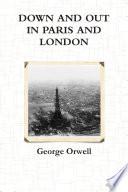Quotes from book
Down and Out in Paris and London

Down and Out in Paris and London is the first full-length work by the English author George Orwell, published in 1933. It is a memoir in two parts on the theme of poverty in the two cities. The first part is an account of living in near-destitution in Paris and the experience of casual labour in restaurant kitchens. The second part is a travelogue of life on the road in and around London from the tramp's perspective, with descriptions of the types of hostel accommodation available and some of the characters to be found living on the margins.

“Fate seemed to be playing a series of extraordinarily unamusing jokes.”
Source: Down and out in Paris and London (1933), Ch. 7

“There is only one way to make money at writing, and that is to marry a publisher's daughter.”
Source: Down and out in Paris and London (1933), Ch. 4; a record of a remark by Orwell's fellow tramp Boris

“Poverty frees them from normal standards of behaviour, just as money frees people from work”
Source: Down and out in Paris and London (1933), Ch. 1
Source: Down and Out in Paris and London
Context: The Paris slums are a gathering-place for eccentric people — people who have fallen into solitary, half-mad grooves of life and given up trying to be normal or decent. Poverty frees them from normal standards of behaviour, just as money frees people from work. Some of the lodgers in our hotel lived lives that were curious beyond words.

“It is fatal to look hungry. It makes people want to kick you.”
Source: Down and out in Paris and London (1933), Ch. 9; a remark by Boris
Source: Down and Out in Paris and London

Source: Down and out in Paris and London (1933), Ch. 30
Source: Down and Out in Paris and London
Context: He was an embittered atheist (the sort of atheist who does not so much disbelieve in God as personally dislike Him), and took a sort of pleasure in thinking that human affairs would never improve. Sometimes, he said, when sleeping on the Embankment, it had consoled him to look up at Mars or Jupiter and think that there were probably Embankment sleepers there. He had a curious theory about this. Life on earth, he said, is harsh because the planet is poor in the necessities of existence. Mars, with its cold climate and scanty water, must be far poorer, and life correspondingly harsher. Whereas on earth you are merely imprisoned for stealing sixpence, on Mars you are probably boiled alive. This thought cheered Bozo, I do not know why. He was a very exceptional man.

“Within certain limits, it is actually true that the less money you have, the less you worry.”
Source: Down and out in Paris and London (1933), Ch. 4
Source: Down and Out in Paris and London
Context: For, when you are approaching poverty, you make one discovery which outweighs some of the others. You discover boredom and mean complications and the beginnings of hunger, but you also discover the great redeeming feature of poverty: the fact that it annihilates the future. Within certain limits, it is actually true that the less money you have, the less you worry.